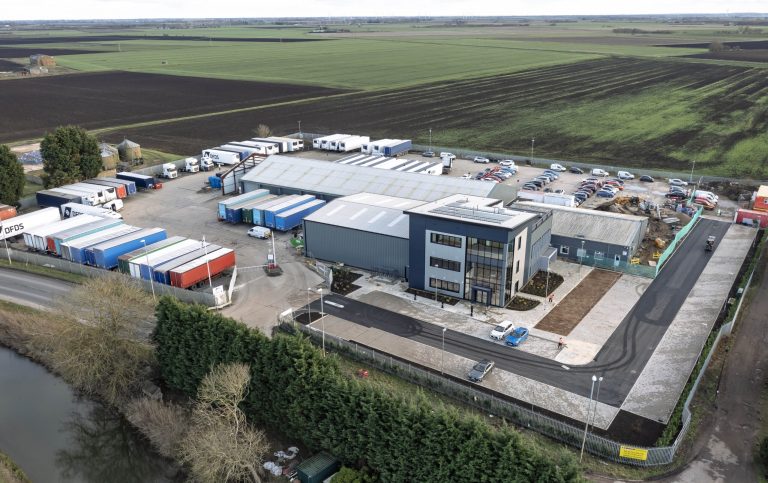Lindum starts work on semi-automated warehouse for DFDS
Hull and East Yorkshire Skills Board names Jayne as first Chair
£2m invested into The Data City
Dacre, Son & Hartley acquires North Yorkshire agency
New Leeds restaurant to target business professionals
Zoom, a new restaurant opening next month on the ground floor of the Hyatt Place Hotel in Leeds city centre, aims to serve business professionals with a mix of global cuisine and Yorkshire-inspired dishes.
The restaurant will offer a menu featuring Crispy Beef, a Superfood Poke Bowl, and a Large Yorkshire Pudding in Sovereign Square. It will also include “The Market,” providing freshly prepared salads, sandwiches, and seasonal specials for on-the-go dining, along with coffee from local roastery North Star.
Zoom will operate daily, with breakfast service from 6:30 a.m. on weekdays and 7:00 a.m. on weekends. Its all-day menu will run from 11:30 a.m. to 9:30 p.m. Monday through Saturday, while Sundays will feature a Roast menu from 11:00 a.m. to 5:00 p.m. before switching to dinner service.
Head Chef Angelina Au, who has worked in luxury hotels including Shangri-La and Four Seasons, is leading the kitchen. The restaurant is designed to cater to hotel guests and the wider business community, offering a space for meetings, corporate dining, and networking.
Ukraine and Lincolnshire partner on agricultural collaboration
Lincolnshire has signed a Memorandum of Understanding with Ukraine’s Kherson Oblast to explore agricultural cooperation. The agreement aims to support the war-affected region through knowledge-sharing and potential future business partnerships.
Oleksandr Prokudin, governor of Kherson Oblast, visited Lincoln on Thursday to formalise the partnership with Councillor Colin Davie of Lincolnshire County Council. Prokudin emphasised the agreement’s symbolic importance and highlighted the challenges facing Kherson, which remains largely under Russian occupation.
As part of his visit, Prokudin toured the University of Lincoln’s Riseholme campus, home to the Lincoln Institute for Agri-Food Technology (LIAT), and the Siemens factory. Davie expressed hopes that Lincolnshire’s farming and food industries could contribute expertise in research, technology, and innovation to aid Kherson’s agricultural sector. He also suggested future trade opportunities may emerge from the collaboration.
The announcement coincides with UK Prime Minister Sir Keir Starmer’s visit to Washington for discussions with US President Donald Trump on Ukraine and defence. Prokudin urged European leaders to remain vigilant, warning that Russian aggression could extend beyond Ukraine.
Four in five firms say increased NI contributions are part of ‘powder keg of costs’
Esh Construction leads social value delivery conversation in Rotherham
Yorkshire Building Society shares £1m with four charities to boost employability
Hotel in Yorkshire Dales National Park sold
Sheffield court jails former Brookside actor for £13.6m modelling agency fraud
A former Brookside actor and his associates have been jailed for a total of 23 years by Sheffield Crown Court for their part in a £13.6m fraud that ran for more than eight years.
- Philip Foster, aged 49, Edificio Marina Mariola, Marbella, Spain, sentenced to 8.5 years for conspiracies to defraud
- Michael Foster, aged 27, Snowdon Lane, Liverpool, sentenced to 3.5 years for conspiracy to defraud
- Paul Evans, aged 39, no known address, sentenced to 3.5 years for offences related to money laundering
- Jamie Peters, aged 52, Pentland Place, Warrington, sentenced to 24 months, suspended for 2 years, for conspiracy to defraud
- Lisa Foster, aged 42, Manchester Road, Astley, sentenced to 18 months, suspended for 12 months, for conspiracy to defraud
- Emily Newall, aged 29, Bolton Road, Kearsley, Greater Manchester, sentenced to 10 months, suspended for 12 months, for conspiracy to defraud
- Atif Qadar, aged 44, Larkswood Drive, Crowthorne, sentenced to 12 months, suspended for 12 months, for conspiracy to defraud
- Paul Fleury, aged 57, Manchester Road, Swinton, Manchester, sentenced to 18 months, suspended for 12 months, for conspiracy to defraud
- Aslihan Foster aged 39, Tredington Road, Coventry, sentenced to 18 months, suspended for 12 months, for an offence related to money laundering
Doncaster clean energy company continues installation of equipment for Northern. Ireland Water
Manufacturing M&A rebounds
SMEs promised share in work from increased defence spending pledge
Third Lincolnshire library launches business hub
Businesses in Grantham are being offered access to a business hub at the town’s library with flexible and confidential workspaces with modern technology.
Spilsby Market relaunch aims to boost local economy
Spilsby Market will relaunch on Monday, 4 March, following efforts by East Lindsey District Council and Spilsby Town Council to revitalise the weekly event. The market aims to attract more traders and visitors, support local businesses, and provide residents with fresh, locally sourced products.
As part of the initiative, the council has introduced a 50% reduction in market fees. Pitches now start at £7.50—among the lowest in the region. The market will operate every Monday throughout the year.
Grantham Library to add business hub with flexible workspaces
Lincolnshire County Council is investing in a new business hub at Grantham Library, providing flexible workspaces and modern technology for local businesses, students, and community groups.
The hub will include an IT suite with business software, drop-in working zones, and acoustic booths for interviews and online meetings. Spaces will also be available for study and educational use.
Grantham is the third Lincolnshire library to receive a business hub, following similar upgrades in Lincoln and Spalding. Renovations, including new carpets and redecoration, are set to begin later this summer.
Barnsley Council unveils £5m business support package
Barnsley Council has announced a proposed £5 million support package to help businesses in the borough, offering financial relief and safeguarding jobs. The initiative, funded through surplus business rates collected nationally and locally, was introduced as part of the council’s budget plans.
The scheme includes 100% business rate relief for eligible retail, leisure, and hospitality businesses operating in Barnsley at its launch. Additional funding will be available for companies not qualifying for rate relief, with access tied to engagement with council business support services.
The package will take effect on 1 April 2025 and run until 31 March 2026. Barnsley and Rotherham Chamber of Commerce welcomed the move, highlighting the pressures businesses face from rising costs and reduced support. The council aims to strengthen the local economy and maintain the vitality of town centres, positioning Barnsley as an attractive place for investment.
Howdens commits to £100m share buyback as market challenges persist
Howdens is set to return £100 million to shareholders through a new share buyback programme, reinforcing confidence in its financial strength despite ongoing pressures in the UK kitchen market.
The company reported steady results for 2023, with revenue rising slightly by 0.5% to £2.32 billion and pre-tax profit edging up 0.2% to £328 million. While market conditions remain tough, Howdens has focused on cost efficiencies and strategic investments to maintain stability.
Last year, the business expanded its footprint with 29 new depots and modernised 76 existing locations across the UK. It also introduced 11 new kitchen ranges, enhanced its digital infrastructure, and upgraded manufacturing and supply chain operations to support its trade customers.





















